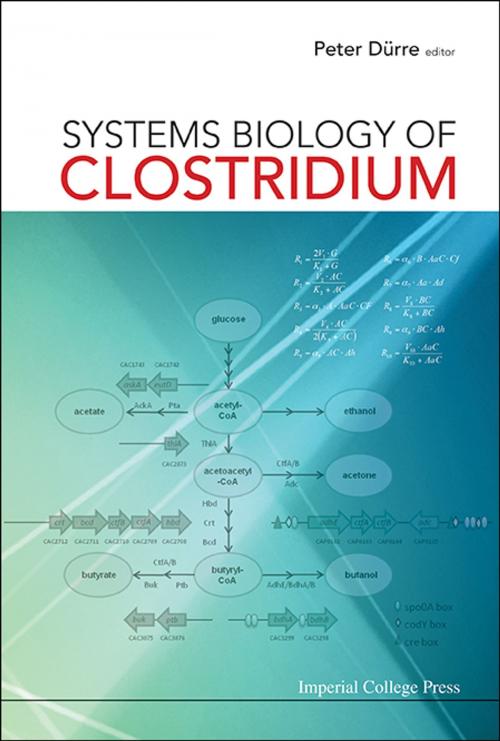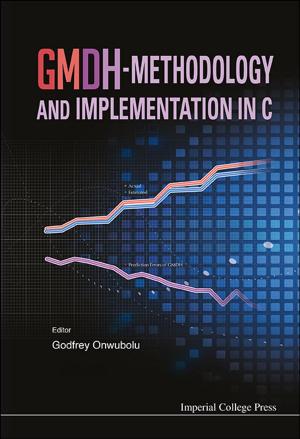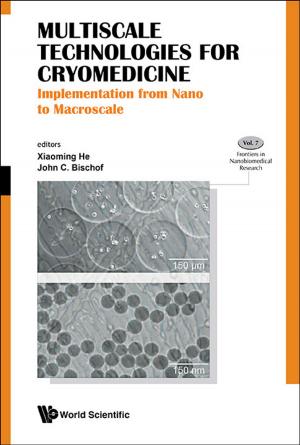Systems Biology of Clostridium
Nonfiction, Science & Nature, Science, Biological Sciences, Biochemistry, Biotechnology| Author: | Peter Dürre | ISBN: | 9781783264421 |
| Publisher: | World Scientific Publishing Company | Publication: | May 5, 2014 |
| Imprint: | ICP | Language: | English |
| Author: | Peter Dürre |
| ISBN: | 9781783264421 |
| Publisher: | World Scientific Publishing Company |
| Publication: | May 5, 2014 |
| Imprint: | ICP |
| Language: | English |
Systems Biology of Clostridium provides a comprehensive overview of system biology approaches in clostridia, especially Clostridium acetobutylicum. Systems biology is a rapidly evolving scientific discipline that allows us to understand and predict the metabolism and its changes within the bacterium as a whole.
Clostridia represent one of the largest bacterial genera. This group contains organisms with metabolic properties that hold enormous potential for biotechnological processes. A model organism is Clostridium acetobutylicum that has been, and is still used in large-scale industrial production of the solvents acetone and butanol. Systems biology offers a new way to elucidate and understand the complex regulatory network controlling the different metabolic pathways and their interactions. All aspects from the development of appropriate experimental tools to mathematical modeling are covered, including a fascinating historical account on acetone-butanol fermentation in World War II.
Written by world-class experts in their fields, Systems Biology of Clostridium is an essential source of reference for all biologists, biochemists, chemists, and chemical engineers working on biotechnological fermentations or industrial applications, as well as biofuels.
Contents:
- Metabolic and Regulatory Networks in Clostridium Acetobutylicum
- Clostridial Gene Tools
- Supporting Systems Biology of Clostridium Acetobutylicum by Proteome Analysis
- Comparative Genomic Analysis of the General Stress Response in Clostridium Acetobutylicum ATCC 824 and Clostridium Beijerinckii NCIMB 8052
- Mathematical Modeling of the pH-Induced Metabolic Shift in Clostridium Acetobutylicum
- Mathematical Models for Clostridia: From Cultivation Description to Systems Biology
- Modeling Agr-Dependent Quorum Sensing in Gram-Positive Bacteria
- Comparative Genomic Analysis of the Central Metabolism of the Solventogenic Species Clostridium acetobutylicum ATCC 824 and Clostridium Beijerinckii NCIMB 8052
- The Strategic Importance of Biobutanol for Japan During WWII: A Case Study of the Butanol Fermentation Process in Taiwan and Japan
Readership: Biologists, chemists, biochemists and chemical engineers working on biotechnological fermentations or industrial applications in biofuels.
Key Features:
- First comprehensive overview of systems biology in the genus Clostridium
- Authors are world class experts in the field
Systems Biology of Clostridium provides a comprehensive overview of system biology approaches in clostridia, especially Clostridium acetobutylicum. Systems biology is a rapidly evolving scientific discipline that allows us to understand and predict the metabolism and its changes within the bacterium as a whole.
Clostridia represent one of the largest bacterial genera. This group contains organisms with metabolic properties that hold enormous potential for biotechnological processes. A model organism is Clostridium acetobutylicum that has been, and is still used in large-scale industrial production of the solvents acetone and butanol. Systems biology offers a new way to elucidate and understand the complex regulatory network controlling the different metabolic pathways and their interactions. All aspects from the development of appropriate experimental tools to mathematical modeling are covered, including a fascinating historical account on acetone-butanol fermentation in World War II.
Written by world-class experts in their fields, Systems Biology of Clostridium is an essential source of reference for all biologists, biochemists, chemists, and chemical engineers working on biotechnological fermentations or industrial applications, as well as biofuels.
Contents:
- Metabolic and Regulatory Networks in Clostridium Acetobutylicum
- Clostridial Gene Tools
- Supporting Systems Biology of Clostridium Acetobutylicum by Proteome Analysis
- Comparative Genomic Analysis of the General Stress Response in Clostridium Acetobutylicum ATCC 824 and Clostridium Beijerinckii NCIMB 8052
- Mathematical Modeling of the pH-Induced Metabolic Shift in Clostridium Acetobutylicum
- Mathematical Models for Clostridia: From Cultivation Description to Systems Biology
- Modeling Agr-Dependent Quorum Sensing in Gram-Positive Bacteria
- Comparative Genomic Analysis of the Central Metabolism of the Solventogenic Species Clostridium acetobutylicum ATCC 824 and Clostridium Beijerinckii NCIMB 8052
- The Strategic Importance of Biobutanol for Japan During WWII: A Case Study of the Butanol Fermentation Process in Taiwan and Japan
Readership: Biologists, chemists, biochemists and chemical engineers working on biotechnological fermentations or industrial applications in biofuels.
Key Features:
- First comprehensive overview of systems biology in the genus Clostridium
- Authors are world class experts in the field















